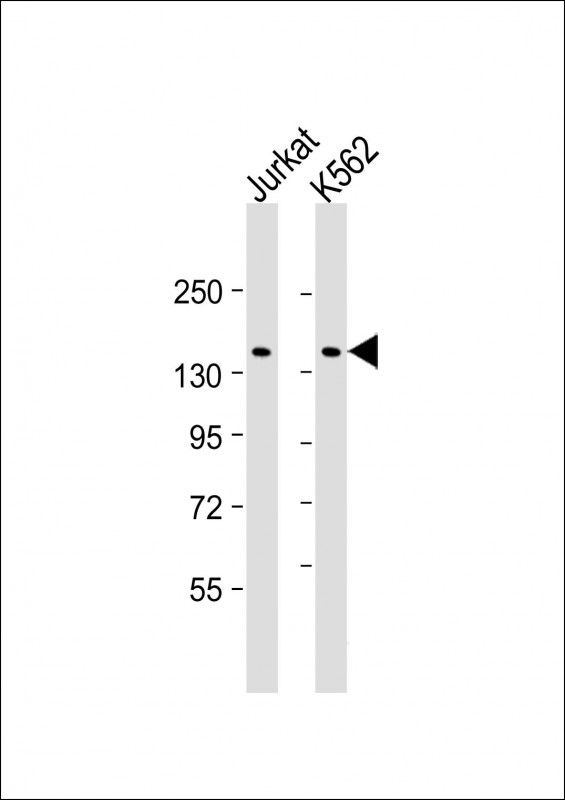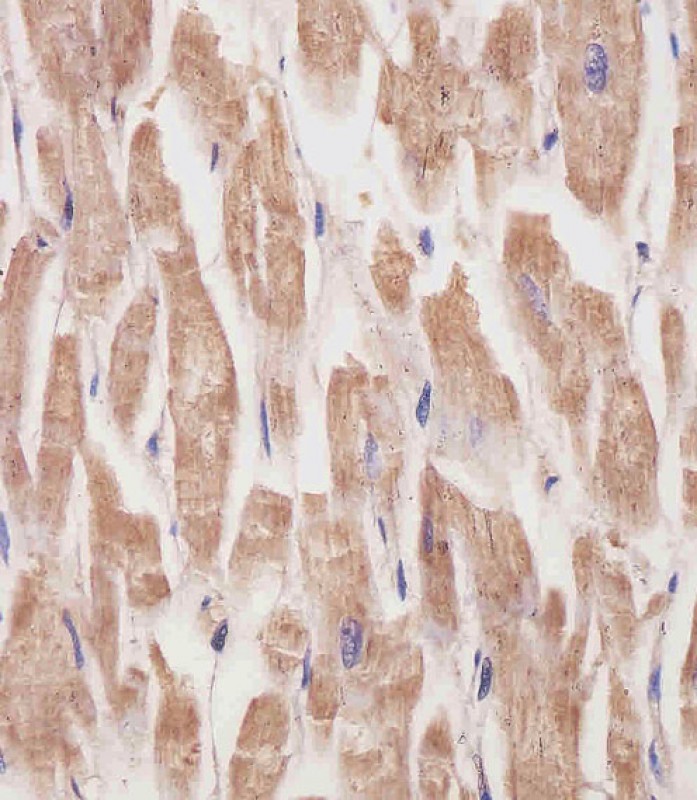

| WB | 1/2000 | Human,Mouse,Rat |
| IF | 咨询技术 | Human,Mouse,Rat |
| IHC | 1/100-1/500 | Human,Mouse,Rat |
| ICC | 技术咨询 | Human,Mouse,Rat |
| FCM | 咨询技术 | Human,Mouse,Rat |
| Elisa | 咨询技术 | Human,Mouse,Rat |
| Aliases | KN motif and ankyrin repeat domain-containing protein 1, Ankyrin repeat domain-containing protein 15, Kidney ankyrin repeat-containing protein, KANK1, ANKRD15, KANK, KIAA0172 |
| Entrez GeneID | 23189 |
| WB Predicted band size | 147.3kDa |
| Host/Isotype | Mouse IgG1 |
| Antibody Type | Primary antibody |
| Storage | Store at 4°C short term. Aliquot and store at -20°C long term. Avoid freeze/thaw cycles. |
| Species Reactivity | Human |
| Immunogen | This KANK1 antibody is generated from a mouse immunized with a recombinant protein of human KANK1. |
+ +
以下是关于KANK1抗体的3篇参考文献及其摘要概括:
---
1. **文献名称**:*KANK1 inhibits cell migration by interacting with β-catenin and regulating actin polymerization*
**作者**:Goyal, R.K., et al.
**摘要**:该研究揭示了KANK1蛋白通过与β-catenin结合调控细胞骨架的动态变化,抑制肿瘤细胞迁移。实验中通过KANK1抗体进行免疫共沉淀(Co-IP)验证了其相互作用,并发现KANK1缺失会导致细胞迁移能力增强。
---
2. **文献名称**:*Loss of KANK1 expression is associated with poor prognosis in renal cell carcinoma*
**作者**:Sato, Y., et al.
**摘要**:研究分析了KANK1在肾细胞癌(RCC)中的表达及其临床意义。利用KANK1抗体的免疫组化(IHC)显示,KANK1低表达与患者预后不良显著相关,提示其作为肿瘤抑制因子和潜在预后标志物的作用。
---
3. **文献名称**:*KANK1 mutations in familial focal segmental glomerulosclerosis (FSGS)*
**作者**:Buvall, L., et al.
**摘要**:该研究在家族性局灶节段性肾小球硬化(FSGS)患者中鉴定出KANK1基因突变。通过Western blot和免疫荧光(使用KANK1抗体)发现突变导致蛋白错误定位,破坏足细胞骨架稳定性,进而引发肾小球损伤。
---
4. **文献名称**:*KANK1 regulates endothelial cell alignment through the PI3K/AKT signaling pathway*
**作者**:Zhou, T., et al.
**摘要**:研究探讨了KANK1在血管内皮细胞排列中的作用,发现其通过PI3K/AKT通路调节细胞极性。实验中使用KANK1抗体进行敲低验证,表明其缺失导致血管形成异常,提示其在血管疾病中的潜在机制。
---
以上文献均通过KANK1抗体在蛋白定位、相互作用或表达分析中展开研究,涵盖肿瘤、肾脏疾病及细胞迁移机制等领域。
The KANK1 (KN motif and ankyrin repeat domain-containing protein 1) antibody is a tool used to detect and study the KANK1 protein, a key regulator of cellular processes. The KANK1 gene, located on chromosome 9p24.3. encodes a scaffold protein involved in cytoskeletal organization, cell migration, and adhesion. It interacts with β-integrin and actin regulators, linking extracellular signals to intracellular cytoskeletal dynamics. KANK1 also acts as a tumor suppressor, with its loss or mutation implicated in cancers, particularly renal cell carcinoma, and neurodevelopmental disorders like cerebral palsy.
Antibodies targeting KANK1 are essential for investigating its expression, localization, and function in physiological and pathological contexts. They are widely used in techniques such as Western blotting, immunohistochemistry, and immunofluorescence to assess protein levels in tissues or cell lines. Research using KANK1 antibodies has revealed its role in suppressing cancer metastasis by modulating RhoA GTPase activity and integrin signaling pathways. Additionally, studies link KANK1 dysregulation to disrupted neuronal development and cell polarity.
These antibodies also aid in exploring KANK1's interactions with binding partners like VHL (von Hippel-Lindau) protein and its involvement in hypoxia-related pathways. Their application extends to clinical research, where altered KANK1 expression serves as a potential biomarker for disease prognosis. Overall, KANK1 antibodies are critical for unraveling molecular mechanisms in cancer biology, neurodevelopment, and cellular mechanics.
×